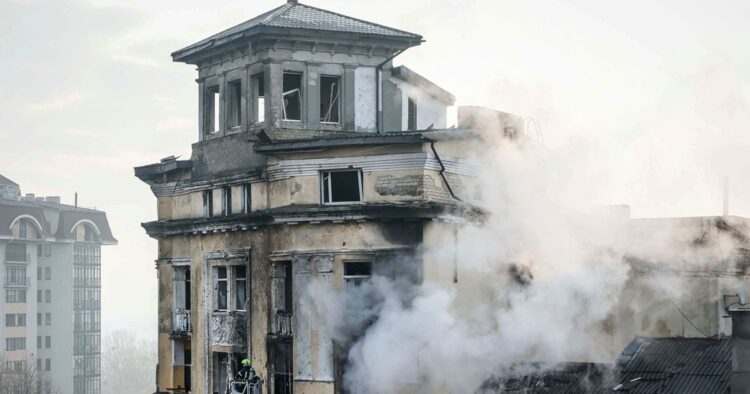In the early hours of Thursday, Ukraine’s capital, Kyiv, faced heavy missile attacks for the first time in six weeks. This onslaught followed a visit by US national security adviser Jake Sullivan to the city. Over 25,000 people sought refuge in the metro stations, reminiscent of scenes from the early days of the conflict. Videos on social media captured the crowded underground shelters as the attack unfolded. Officials reported that all 31 missiles fired by Russia were intercepted, preventing casualties.
Among those affected, an 80-year-old resident described being woken by a blast that shattered her windows, leaving her home damaged but herself unharmed. Another individual, whose flower shop suffered damage for the second time in a year, expressed concern about security until repairs were made. While there were no major infrastructure hits, images showed a crater near residential buildings, highlighting the peril faced by civilians.
President Volodymr Zelensky emphasized the need for increased military support from allies to counter such attacks, insisting on advanced defense systems to safeguard Ukrainian territory. The origin of the ballistic missiles remains under investigation, with speculation pointing to North Korean or Russian-made variants. Ukrainian intelligence indicated that the targets were primarily facilities belonging to Ukraine’s Defense Intelligence, suggesting a strategic aim behind the attacks.
In response to the assault, Ukrainian volunteer fighters held a press conference, claiming to have retaliated with a drone strike on Russian territory. They boasted of disrupting Russian military plans and extending the conflict onto enemy soil. The involvement of volunteer groups underscores the multifaceted nature of the conflict and the determination of Ukrainian forces to resist Russian aggression.
Meanwhile, international concern has grown over North Korea’s alleged involvement in supplying missiles to Russia, further complicating global dynamics. US and South Korean officials have accused North Korea of supporting Russia with military equipment, signaling a concerning escalation. This development not only impacts the conflict in Ukraine but also reverberates across the Korean Peninsula, potentially altering regional security dynamics.
Efforts to provide additional military aid to Ukraine face hurdles in the US Congress, with disagreements delaying crucial support. While the Senate approved a significant aid package, its passage in the House remains uncertain. Discussions center on finding a bipartisan solution to expedite aid delivery, reflecting the urgency of the situation on the ground.
Amidst these developments, a NATO delegation visited Kyiv, underscoring the alliance’s solidarity with Ukraine. The delegation’s presence at the Kyiv Security Forum symbolized NATO’s commitment to supporting Ukraine in its struggle for sovereignty. Adm. Rob Bauer emphasized the importance of democratic values in countering Russian aggression, highlighting Ukraine’s role as a bulwark for democracy in the region. He praised Ukraine’s resilience and innovation in modern warfare, urging continued international support for its defense efforts.
As Ukraine confronts renewed attacks and geopolitical challenges, the global community faces a critical juncture in shaping the outcome of the conflict and safeguarding regional stability.

















Comments